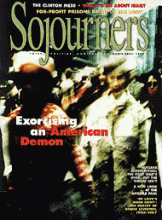The drama that unfolded in the arrest and court proceedings of Theodore Kaczynski deserves serious, even prayerful, reflection. In part it focuses our attention on that most basic of all communities, the family. While the media mostly treated this case as a titillating show, those who see
the family as the building block of community, indeed of society itself, may find this tragedy holds crucial lessons for all who relate to families that is, for all of us.
The contours of the case are well known. A strange, reclusive loner leaves enough clues to his identity as the long-sought Unabomber for his younger brother to suspect him and inform the FBI. His arrest and the subsequent exhaustive search of his cabin lead to trial preparations and eventually a surprise guilty plea. In an incredible turnabout, the brother, David, together with their mother, Wanda, appear in court to stand with Theodore and plead for his life.
The cost to brother and mother of this support seems incalculable. The opening scene in court finds David and Wanda weeping side by side in the courtroom as brother and son Theodore strides by ignoring their presence. He has had no contact with David for 12 years or with Wanda for 16. That tableau of the weeping mother and brother, which typifies the entire family tragedy here, lends itself to some profound and, one would hope, instructive questions about the vagaries of family life.
The most compelling of these questions is also the most obvious: How could two siblings turn out so differently? The responsible member of society, David, who had the moral courage to expose his older brother, with the consent and backing of their mother, came out of the same household as the weird, anti-social killer, Theodore.
Read the Full Article
